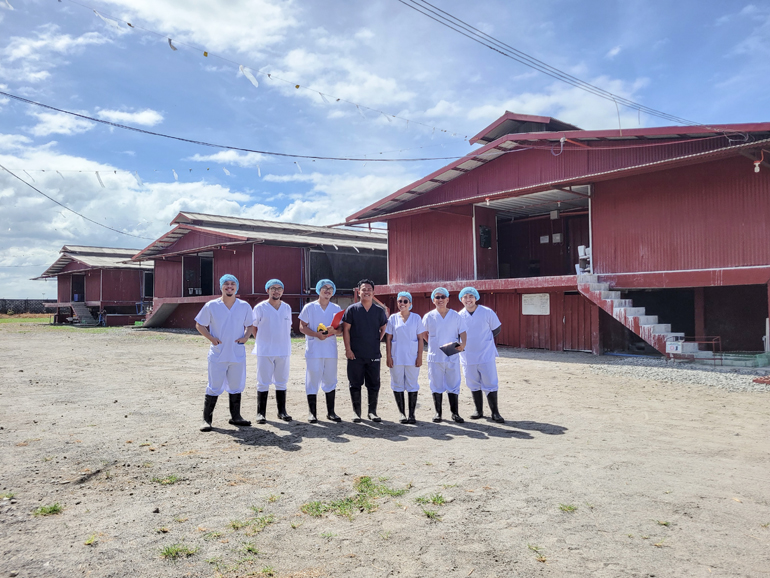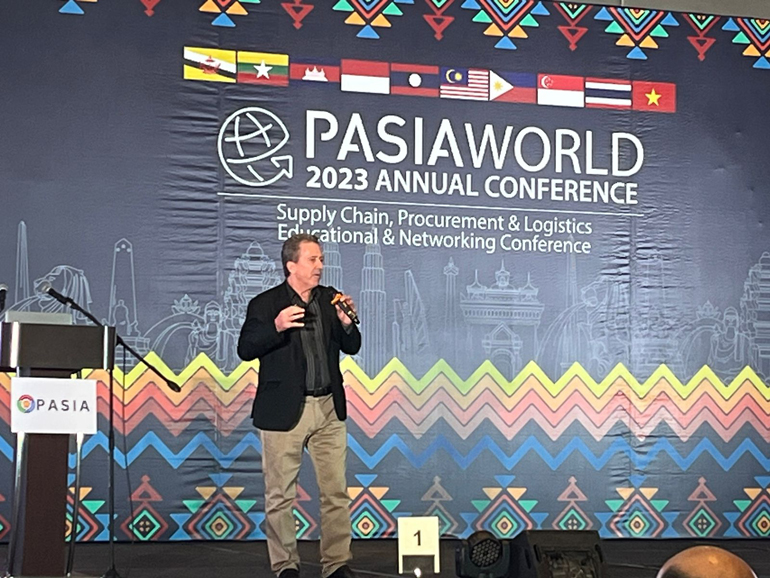THE BANGKO SENTRAL ng Pilipinas (BSP) is still prepared to adjust interest rates as necessary amid persistent upside risks to the inflation outlook, a central bank official said.
In a BusinessWorld Insights webinar on Thursday, BSP Deputy Governor Francisco G. Dakila, Jr. said risks remain despite inflation easing to a three-year low in January.
“Given the prevailing upside risks to the inflation outlook, the BSP is prepared to adjust its monetary policy settings as necessary in keeping with its primary mandate of safeguarding price stability,” he said.
Nonmonetary measures also remain crucial to sustain the disinflation process and address lingering supply-side pressures, he said.
After emerging as the most aggressive central bank in the region, the BSP kept the key rate at 6.5% — the highest in nearly 17 years — for a third straight meeting in February.
The Monetary Board hiked borrowing costs by 450 bps from May 2022 to October 2023 to tame inflation and help support the peso against the dollar.
Price pressures have receded in the past months as inflation has been within the 2-4% target since December 2023, Mr. Dakila said.
“Inflationary pressures for most key food and nonfood items have steadily eased, supported by government supply-side measures alongside negative base effects,” he said.
Inflation eased to the lowest in three years to 2.8% in January from 3.9% in December and 8.7% a year ago. It was the second straight month that inflation was within the BSP’s 2-4% target.
Mr. Dakila also noted that core inflation continued to fall in January, after staying above 2-4% for 17 consecutive months.
Core inflation, which excludes volatile prices of food and fuel, slowed to 3.8% in January from 4.4% in December, the slowest since 3.1% in June 2022.
Last week, the BSP trimmed its baseline inflation forecast for this year to 3.6% from 3.7% but kept its projection for 2025 at 3.2%.
“The forecast path is driven by the lower-than-expected inflation outturn in December and January, by the appreciation of the peso, and by lower global crude oil prices,” Mr. Dakila said.
The BSP also lowered its risk-adjusted inflation forecast for this year to 3.9% from 4.2% but raised its outlook for 2025 to 3.5% from 3.4%.
The downgrade in the BSP’s risk-adjusted inflation forecast was due to the lower baseline forecast and the decline in the estimated risks for the year, Mr. Dakila said.
“However, it should be noted that the risk-adjusted forecast is still near the upper end of the target range at 3.9% in 2024,” he added.
The central bank is closely monitoring the developments in the agriculture sector, especially as rice prices continue to rise due to export bans abroad and worries over the impact of El Niño.
Rice inflation accelerated to 22.6% from 19.6% in December, the highest since March 2009. It was also the most significant contributor to January inflation, adding 1.3 percentage points. The commodity had the biggest weight in the overall inflation basket at 8.87%.
Other risks to the inflation outlook include higher assumptions for global nonoil prices, a stronger domestic growth outlook, the impact of El Niño weather conditions and minimum wage adjustments in areas outside Metro Manila, Mr. Dakila said.
“While inflation is likely to settle within the target range in the first quarter of this year, inflation could rise temporarily above the target for the April-to-July period due to possible price pressures from lower domestic supply of rice and corn as well as positive base effects,” he added.
Meanwhile, Mr. Dakila said the gross domestic product (GDP) growth trajectory remains intact over the medium term.
“The projected GDP growth path will be supported by improved global GDP amid a projected decline in global crude oil prices, tempered in part by the lagged impact of policy interest rate adjustments,” he said.
In the fourth quarter, GDP expanded by 5.6%, slower than 6% in the third quarter and 7.1% in the fourth quarter of 2022.
This brought full-year GDP growth to 5.6% in 2023, much slower than 7.6% in 2022.
“This may be attributed to the waning of pent-up demand amid still elevated — though decelerating — inflation, the lagged effects of monetary tightening, as well as lower government spending in line with fiscal consolidation,” Mr. Dakila said.
Still, he noted that at 5.6%, the Philippines was among the fastest-growing emerging markets in the region last year, ahead of China (5.2%), Indonesia (5%), Vietnam (5%) and Malaysia (3.8%).
RATE CUT BY Q2
Meanwhile, Sun Life Investment Management and Trust Corp. (SLIMTC) expects the BSP to likely reduce policy rates by 100 basis points (bps) this year.
SLIMTC Chief Investment Officer Ritchie Ryan G. Teo said at a briefing on Thursday that the central bank is expected to begin policy easing with a 25-bp cut in the latter part of the second quarter.
“We don’t expect more than that given cost volatility,” he added. “More on the latter part (of the second quarter). It’s probably good to say they will only cut when the Fed cuts.”
Mr. Teo said the US Federal Reserve will likely cut rates by 75 bps to 100 bps to bring down the Fed funds rate to 4.5-4.75% this year.
The US central bank had raised its policy rate by 525 bps to 5.25-5.5% from March 2022 to July 2023.
The BSP now has room to begin policy easing given the recent downtrend of inflation, Mr. Teo said.
“Policy rates are higher than the inflation rates. We’ve seen inflation coming down and with that, we are already seeing that gap, that real positive rate means there’s room to cut rates,” he added.
SLIMTC sees inflation averaging 3.8% this year.
Mr. Teo also noted he is not ruling out a rate hike but the probability of that happening is “very low.”
“With lower rates, that will provide better corporate earnings and with lower rates also that will provide GDP to go back up to 6% from 5.6% last year, driven by better consumption and private investments,” he said.
SLIMTC’s forecast for GDP growth is at 6% this year, falling short of the government’s 6.5-7.5% target but better than the 5.6% expansion in 2023.
Finance Secretary Ralph G. Recto earlier said there may be a need to revise the government’s macroeconomic targets and assumptions to be “more realistic.”
Meanwhile, Mr. Teo flagged risks that could stoke inflation and dampen growth, such as the El Niño weather phenomenon.
“If the (El Niño) doesn’t improve, it may impact soft commodity prices. We’ve seen rice inflation go up by 22%, so hopefully that’s mainly because of the low base effect last year,” he said. “With the harvest season and El Niño going away, hopefully inflation will be controlled.”
The latest data from the state weather bureau showed that El Niño is expected to persist until May.
Another factor that could derail growth is delayed infrastructure spending, Mr. Teo said.
The administration’s ‘Build Better More’ infrastructure program is allocated P1.5 trillion under the budget this year, equivalent to 5.5% of gross domestic product (GDP).
The government is targeting to sustain infrastructure spending of up to 5-6% of GDP annually.
Infrastructure spending in the January-November period rose by 18.5% to P1.02 trillion.
“We expect that (underspending) is something that should be resolved sooner mainly because there’s been efforts by the government, they already called out the underspending but unfortunately it seems like the disbursements aren’t there yet. But once they are released, we expect that to improve also,” Mr. Teo added. — Keisha B. Ta-asan and Luisa Maria Jacinta C. Jocson
 As AKF provided animal welfare inputs and technical advice, BFI underwent a rigorous and comprehensive inspection in compliance with the Philippine National Standards (PNS) Code of Practice for Cage-Free Egg Production. The standards specify the components of good management of a cage-free egg farm.
As AKF provided animal welfare inputs and technical advice, BFI underwent a rigorous and comprehensive inspection in compliance with the Philippine National Standards (PNS) Code of Practice for Cage-Free Egg Production. The standards specify the components of good management of a cage-free egg farm.

















